Pentagon Helix Cluster. Baltic Sea & Space Cluster of Hubs [ZEVInnovation, ICT & AI, GREENTECH]
Baltic Sea and Space Cluster specialized research teams operate within six Hubs, which brings together 60 Polish innovative companies.
There are currently six Hubs: ICT & AI, construction of zero-emission ships – ZEVInnovation, design and construction of installations producing green energy – GreenTech, scientific-research, legal-financial and educational. All hubs bring together around 60 companies, research centers and R&D units. They cooperate with a group of approximately 2,300 cooperators, companies specializing in the design and implementation of innovative marine and space technologies, research and development, education and professional training for maritime industries.
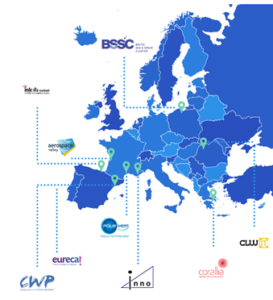
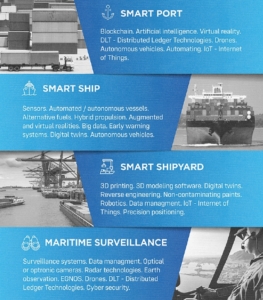
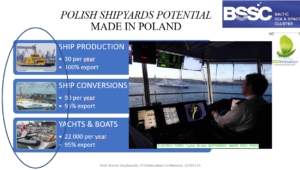
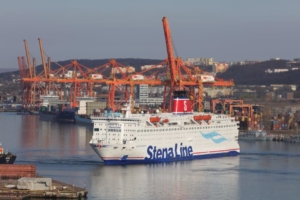
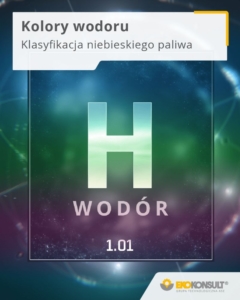
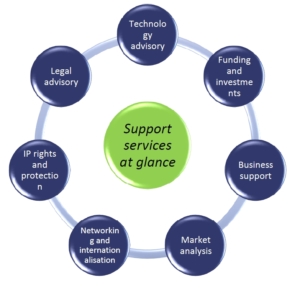
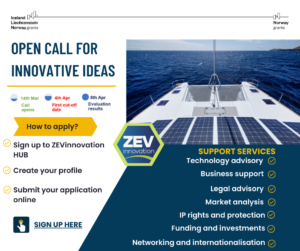
Thanks to the active cooperation, the best Polish initiatives have a chance to be commercialized in the maritime sector. Among others, there is already an emission-free ship HUB, ICT & AI HUB as well as an idea for a hybrid system of renewable energy production.
For over a dozen years the Baltic Sea and Space Cluster (BSSC) has been supporting innovations and development in the field of research, entrepreneurship, administration and local government, which are related to the Baltic Sea Region and the world ocean.
Pentagon Helix Cluster
The Baltic Sea and Space Cluster is a continuation of activities undertaken by its members, who over 25 years ago took the initiative to establish a maritime cluster in Poland. During the period of economic transformation, it integrated the activities of leading maritime enterprises on innovative undertakings and new markets. As a result, in 2009 the leaders of the National Chamber of Maritime Economy established Polish Maritime Cluster.
After a short period of incubation and activities in the Triple Helix formula, the cluster through participation in international projects transformed into an organization operating in the Qudralupe Helix system.
– Today the cluster develops in the Pentagon Helix formula, integrating the transfer of knowledge between science and business, supporting social initiatives, local government and administration, developing investor relations, says Marek Grzybowski and explains that today the cluster’s activity is characterized by a holistic, integrative and global approach, making the activity of maritime industries part of Economy 4.0. – We owe our position also to the close cooperation with the Space Science Commission of the Gdańsk Branch of the Polish Academy of Sciences. 4 conferences on space and maritime technologies, maritime and space law, economics and social sciences are organized jointly every year.
Cluster of HUBs
Within the „Cluster” there are currently six Hubs: ICT & AI, construction of zero-emission ships – ZEVInnovation, design and construction of installations producing green energy – GreenTech, scientific-research, legal-financial and educational. All hubs bring together around 60 companies, research centers and R&D units.
Within the „Cluster” Hubs, i.e. highly specialized small clusters, operate successfully, a type of consortia. Within them, tasks are carried out in a specific field and professional activity. In other words, a team of experts from a given hub is responsible for issues it knows best.
– The essence of creating Hubs in a cluster was to organize their intellectual potential, research and development capabilities, commercialization and internationalization of innovations, explains Zdzisław Długosz PhD., Director of the Safety & Security Research Institute and participating as an expert in the GALATEA project.
In order to work well on a given project, the idea of thematic Hubs was born. Many of the projects that the BSS Cluster conducts have an international character. For this reason, someone has to watch over, for example, the compliance with international law.
– The lack of this quality may result in legal problems when settling a project, a contract. We do not have such problems, emphasizes Długosz PhD. – Guarding all
these complexities is within the scope of our legal and financial hub, coordinated by Mateusz Romowicz from Legal Maritime.
– Very often Polish companies compete with each other. Our task is to extract their optimal potential and use it on the international arena, explains Michał Igielski PhD. from the BSSC Project Office, responsible for coordinating the ZEVInnovation project, implemented under the Norway grants with partners from Norway and Croatia.– However, what matters to us the most are the companies that „want to do something” with the greatest potential for innovation and technology. To make it easier for them, we create cooperation groups, i.e. thematic Hubs.
Hubs have a business purpose
Experts from the BSS Cluster emphasize that hubs have been already working for each other, the idea being that they complement and permeate each other.
– Among other things, they are supposed to watch over the compatibility of various ideas. It happens that there is a proposal, for example to create a training centre, that does not fit Polish reality at all, says Alfred Naskręt, Cluster board member, director of Gdynia Maritime School. – Then the education hub gives its opinion on the proposal. Analyses of Hub experts are sent to decision-making centres. They present the reality prevailing in the country and international environment; they express a common view of companies that operate in the cluster and in the education sector, explains Master Mariner Alfred Naskret.
The Hubs base their activities on a specific strategy and objectives.
– For example, for the ICT and AI HUB such a goal is to create an IT Service Centre for the maritime and space industry. We have already collected domestic money for this purpose, now it is time for foreign funds, informs Michał Igielski PhD. and adds that the cluster will be an institution coordinating the work of this centre.
ICT & AI Hub – the future in intelligent technologies
The task of companies belonging to this hub is to create modern and innovative ICT solutions, which will be used by companies and institutions operating in maritime and space business.
– In short, the aim is to use the potential of IT companies operating in the Cluster to transform small and large ports, shipyards and other maritime and space businesses into intelligent organizations operating efficiently in the Global Economy 4.0, explains Marek Grzybowski, The president of the Cluster, ret. Professor of Gdynia Maritime University. He also adds that this efficiency should consist in the fact that Polish maritime and space companies should be economically effective, efficient on international markets and bring tangible benefits to the Polish national economy.
All these projects are addressed to industry and maritime administration, local governments and state administration. But they are aimed at creating a synergy effect from cooperation within a cluster of small and medium enterprises.
– Internationalization of these projects increases the so called intellectual human capital,” emphasizes Krzysztof Anzelewicz, the vice-president of the Cluster and the Shortsea Promotion Centre Poland, and explains: – Access to state-of-the-art technologies and cooperation within the project increases the intellectual potential and development possibilities of those Polish companies that work in international teams in such projects as e.g. Galatea, whose name clearly delineates the direction of development of maritime industries and maritime transport: GALATEA (Grow and AcceLerate your smArt projecTs in nEw value chAins of the European Blue Economy).
This means that Polish companies, thanks to the international activity of the Cluster, may participate in technologically advanced international projects. The digital hub, ICT & AI, may be the first to successfully possess such competencies. Then, on the basis of cooperation, these skills would be transferred to other companies.
Hub ZEVinnovation. Market for 400 zero-emission ships
The GreenTech and ZewInnovation Hubs are based on the same strategy as ICT & AI.
– We assume that within the ZEVInnovation Hub Polish shipyards will build more zero-emission ships than before, says Michał Igielski PhD. Electric ferries are already successfully built by Crist and Remontowa Shipbuilding.
The demand for this type of vessels is reported by the cluster’s partners on the Norwegian and Croatian markets. And these are not the only markets that report demand for zero-emission ships.
– The research shows that there is demand for at least 200 such electric or zero-emission ships on the Scandinavian market. Whereas the Adriatic and Mediterranean markets will need more than 240 zero-emission ships, informs Marek Grzybowski and emphasizes: – Therefore, the HUB ZEV being created with partners from Norway and Croatia will be a portal with high potential for innovation and international cooperation aimed at a large international market.
GreenTech Hub and aquaponics
The idea of the GreenTech Hub, on the other hand, is based on a preliminary analysis of the demand for such solutions in the coastal municipalities and small ports of the Baltic Sea region. It focuses on identifying hybrid solutions resulting from the needs of local clusters, Polish coastal municipalities and small ports.
– We want to install diversified sources of renewable energy in Poland such as wind, solar, biotechnological and hydrogen energy, as well as energy from sea currents, Igielski says. – We also want to store this energy. And here we cooperate with a member of our Cluster, Technology Group ASE, which has experience in production of industrial installations and possesses technology that allows to build stationary energy warehouses and energy warehouses on ships. The management of energy obtained from so many sources will allow for software using artificial intelligence, which will distribute the stored energy to local consumers.
Within this cluster there is also an idea for ecological food production, aquaponics farms.
– On the basis of nitrogen, which is produced from fish excrements, 100 percent ecological plants will be grown, among other vegetables and fruit. We plan to create demonstration installations, which we want to place in key locations in Pomerania and the neighboring voivodships, explains Michał Igielski.
Galatea project. From local to international market
A good example of this is the Galatea project, which is aiming connecting innovative companies with the Polish maritime industry – with ports, shipyards, maritime offices. The task of these companies is to provide paid services to the industry in order to create innovative projects together. The strong position of the Baltic Sea and Space Cluster has resulted in the Cluster being invited to international projects with a high degree of innovation.
– The Cluster was invited by Aerospace Valley and Le Pôle Mer Méditerranée to participate in the GALATEA project implemented under Horizon 2020, which also involves clusters from Spain, Romania and Greece. The aim here is to connect small companies in innovative projects in maritime industries, says Krzysztof Anzelewicz.
The first call for projects took place in spring 2021. From Europe, about 200 companies submitted about 80 projects, of which 16 were qualified for implementation. Among them are two international projects whose leaders are companies from Poland. REX.IO is an IT company while SeaData is a company using satellite and IT technologies to monitor pollution in ports.
The second round of call for proposals lasted until 8 December. – We support and encourage small, medium and micro companies, which have potential, but do not have means to implement innovations, to participate in the GALATEA project, adds Krzysztof Anzelewicz and emphasizes: – However, the initiative lies here on the side of entrepreneurs. It is a chance to go from local to international market, which is provided by our Cluster.
– Our Baltic cluster has managed to reach the world level of activity, explains Marek Grzybowski, the president of the Cluster. – We are the only maritime/space cluster in the world. All the clusters that have been created so far are aviation/space clusters, emphasizes Prof. Grzybowski. – This is the effect of diffusion and transfer of knowledge between technologies used in space and maritime industries.
The position of the Cluster is a result of the active participation of Pomeranian universities, the Institute of Oceanology PAN, members and partners of the BSSC in our initiatives. We disseminate and commercialize Polish knowledge, not only in the technical area. We use also our legal, organizational, economic and educational potential.
source: https://www.marinepoland.com/pentagon-helix-cluster-baltic-sea-space-cluster-of-hubs-contributes-to-the-success-of-polish-companies-1468
